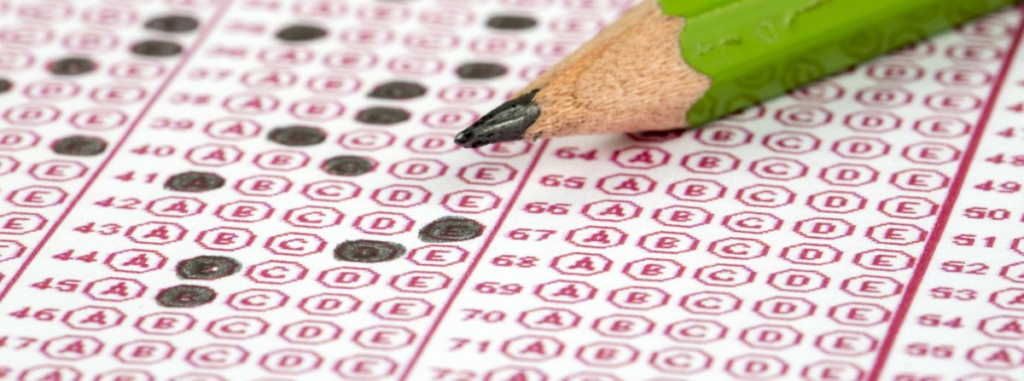How Seriously Should We Take Standardized Tests?

It still gives me shivers when I think back to the time when I was preparing to take my SAT exam last year.
When we think about Standardized testing, we refer to the Scholastic Aptitude Test (SAT) or the American College Testing (ACT) exams, where millions of students take them every year worldwide. While many colleges, including the prestigious ones such as Harvard University, New York University, Williams College, etc., extended their test optional policy for the 2023-2024 admission cycle, the demand for standardized testing has only increased in recent years.
I have seen many of my peers, myself included, take the SAT exam repeatedly with the hope of getting a “high” score. I’ve seen many people give up on sleep time and exercise, taking tutoring classes every weekend just to score 10 or 20 points higher on these exams. I’ve seen anxious parents of eighth and ninth graders seek advice from high school seniors on where to find good tutoring institutes for their children. I’ve seen numerous tutoring institutions that post high testing scores of students, indicating how their training has helped students achieve excellence on these standardized tests …
Many people believe that taking standardized tests are necessary determinants of whether or not we can graduate or whether we are able to get a job. The purpose of these tests, theoretically speaking, is to provide an objective way to assess students’ knowledge and skills they obtained throughout their study in highschool. Since these tests use uniform scoring and evaluation criteria, it reduces people’s subjectivity in grading.

But the question is, is it really subjective and worth spending time on getting points higher?
That may not always be the case.
I took my first SAT exam in August, 2022. At the time, I went to take the test with very little preparation and the purpose was to “test my ability.” I received a score just above 1300 (the full score is 1600). I wasn’t satisfied with the result, but I didn’t know how to improve. My mom soon contacted an expertised tutoring agency, and the teachers promised us that I would receive a score above 1500 after taking 15 lessons. Without hesitation, my parents registered the lessons for me and paid ¥30,000+. From September to November, I went to the agency every Saturday and on holidays, doing mock tests and practice questions over and over again. Finally, in the December SAT exam, I scored 1500+.
To most people, it seems impressive that I was able to improve my score on this exam by almost 200 points. I was also shocked that I was able to achieve a score that I believe is “beyond my capabilities” But now that I think about it, the trade-offs were enormous.
During the two months I was preparing, I had to go tutoring all day on Saturdays – meaning I only had one day off a week and could only spend Sundays working on the immense amount of homework for my junior year. This severely limited my time for the leisure activities I used to enjoy, such as swim practice, reading, and various volunteer activities. I spent most of my time in boredom and hopelessness – practicing the SAT questions from previous years and trying to memorize the “tricks” to ace the problems.
What proved particularly distressing for me was the toll that intensive preparation exacted on my mental well-being. As a habitual long-sleeper, I found myself managing just about five hours of sleep each night over those grueling two months. This chronic sleep deprivation took a substantial toll on my mental health. I found it incredibly challenging to concentrate on my schoolwork; I was drained of the vitality needed for extracurricular pursuits; I disengaged from social interactions due to constant fatigue. Whenever I noticed that my practice scores stagnated or decreased, it would lead to emotional breakdowns. I also had to deal with high expectations from my parents, particularly my mom. I argued with her when she noticed no improvement in my practice scores and questioned the value of her investment. Combining all these factors turned me into a ‘zombie-like’ individual. I was constantly overwhelmed by emotional turmoil, and it rendered me unrecognizable even to myself.
I also realized that many of my friends have had the same thing happen to them. Some of them have taken SAT five times, but they are still dissatisfied with their score and spend money and time to get a higher score. Some of them did not do well in the exam, not because they are not capable, but because they put themselves under tremendous pressure, which led to exam anxiety that can affect their ability to concentrate and do their best.
Research has shown that the emphasis on test scores can sometimes shift the focus from a love of learning to a desire for high test scores. This can discourage our curiosity, creativity, and intrinsic motivation to learn for the sake of learning…
If you are planning on, or considering to take standardized tests recently, my only advice for you is to just try your best, but don’t spend too much time and energy on it. Because, after all, it’s just a score. Don’t let it define you as a person and harm your self-confidence. Remember, you are much more than that.
